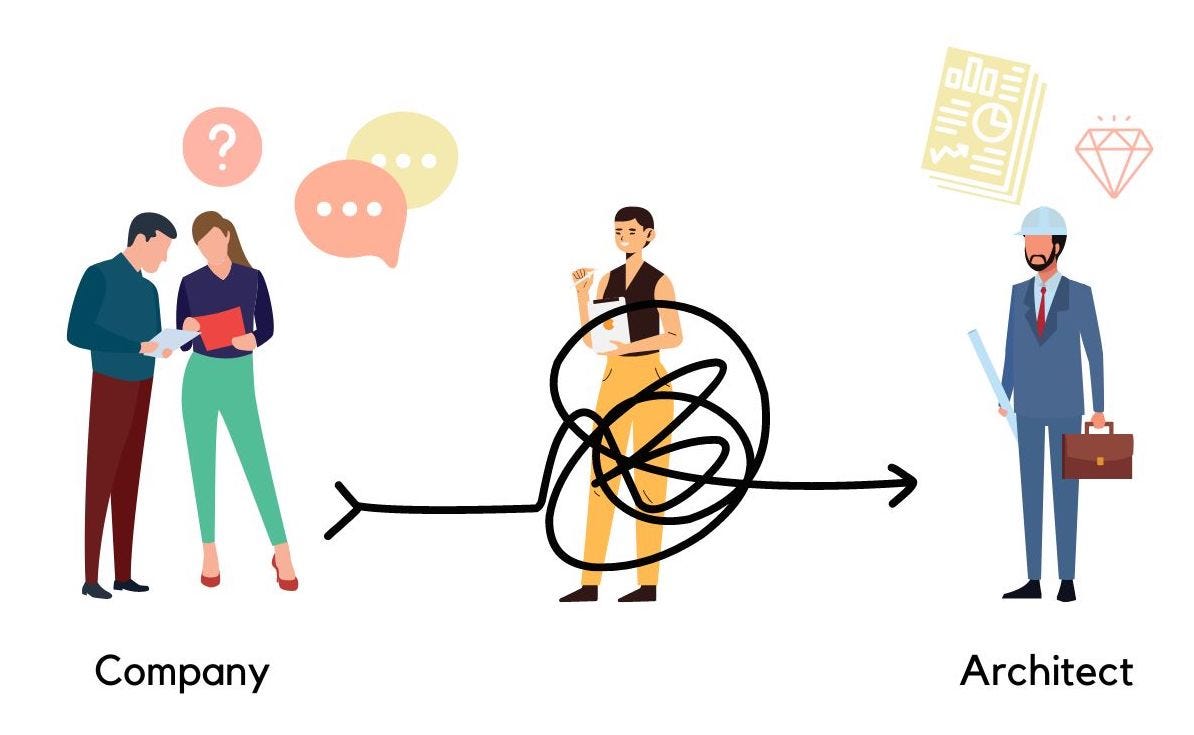As a founder, your company's physical space can play a critical role in your success. It can impact employee productivity, team morale, and customer perception. However, the process of designing and constructing your company's physical space can be overwhelming. It's not always easy to balance your vision for the company with the practicalities of designing a functional space.
It's not uncommon for founders to get carried away with an architect's ideas without considering the long-term effects. This can lead to unnecessary expenses, delays, and a space that doesn't align with your business needs. That's why it's essential to work with someone who can bridge the gap between business and architecture.
Enter the "in-between" person – someone who understands both the language of business and architecture and can serve as a link between you and the architect. This person ensures that your goals and vision are clearly communicated to the architect and that the architect's ideas align with your business needs.
A consultant can act as your advocate, ensuring that the physical space meets your business requirements and aligns with your culture. They can help you identify the key features and projects that will support your goals and vision, while also managing the budget and timeline.
Moreover, a consultant can help you communicate with your team and ensure that the new space is a reflection of their needs and preferences. They can conduct surveys and interviews with your employees to understand their work patterns, preferences, and requirements. This input can be invaluable in designing a space that supports your team's productivity, collaboration, and well-being.
In summary, designing and constructing a physical space for your company can be a complex undertaking. However, with the right support, you can create a space that aligns with your business needs, culture, and vision. By working with an experienced consultant who understands both business and architecture, you can ensure that your physical space is an asset, not a liability.
Here are some tips for founders who are designing and constructing their company's physical space:
Start with a clear vision: Before you begin designing your physical space, it's important to have a clear vision for your company. What are your goals, values, and culture? How do you want your physical space to support these elements? Having a clear vision will help you make decisions that align with your business needs.
Consider your team's needs: Your physical space should support your team's productivity, collaboration, and well-being. Consider how your team works, what they need to be successful, and how the physical space can support these needs. Conduct surveys and interviews with your employees to understand their preferences and requirements.
Work with an experienced consultant: As I mentioned earlier, working with an experienced consultant can be invaluable. They can act as your advocate, ensure that the physical space meets your business requirements, manage the budget and timeline, and communicate with your team.
Prioritize functionality over aesthetics: While it's important to have a visually appealing space, functionality should always be your top priority. Make sure that your space is designed to support your business needs first and foremost.
Create flexible spaces: Your business needs may change over time, so it's important to design a space that can adapt to these changes. Create flexible spaces that can be reconfigured as needed, such as modular workstations or movable walls.
Don't forget about sustainability: Sustainable design is not only good for the environment, but it can also save you money in the long run. Consider incorporating sustainable materials, energy-efficient lighting, and water-saving features into your physical space.
Test your design: Before you commit to a final design, test it out. Create mock-ups or use virtual reality to get a sense of how the space will function in real life. This can help you catch any issues before construction begins.
By following these tips, you can create a physical space that supports your business needs, aligns with your culture, and contributes to your overall success.
Thanks for reading!



